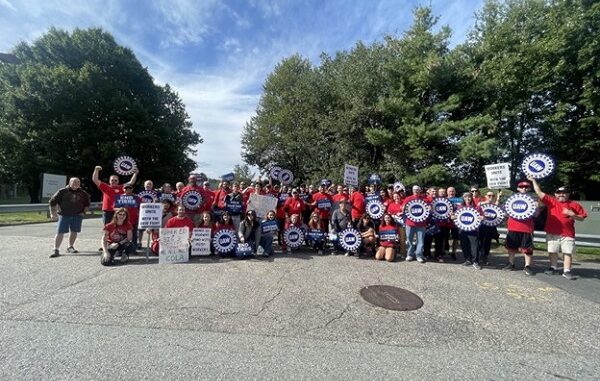
On 15 September, members of the Independent Socialist Group (ISG) joined with United Auto Workers (UAW) members and other supporters at a practice picket in Mansfield, MA, to show support for a strike.
Following the expiration of their contracts the night before, 13,000 UAW members at assembly plants in Michigan, Missouri, and Ohio who work at the ‘Big 3’ auto companies (General Motors, Ford, Stellantis) walked out.
A UAW shop steward at the picket spoke with ISG members about how workers have been “getting the short end of the stick for decades while the company makes money hand over fist.”
UAW members have taken concessionary contracts for years, while the Big 3 car manufacturers have raked in $250 billion in the last decade. The two corporate political parties, Democrat and Republican, handed out massive bailouts and loans to the big car companies, including $80 billion in bailouts in 2008-09 from both the Bush and Obama administrations, and $9 billion in June from the Biden administration for building non-unionised electric vehicle battery plants in Kentucky and Tennessee.
In the past year, the CEOs of the Big 3 have refused to invest billions in production, choosing to dole out $5 billion to rich shareholders through stock buybacks instead. In the first six months of 2023, the Big 3 also reported profits of $21 billion. This doesn’t stop the corporate media from echoing the propaganda of the CEOs when they label the UAW wage demands as “unrealistic.”
Union auto workers’ demands include a 36% wage increase over four years, a 32-hour work week with no reduction in pay, the elimination of the two-tier wage system where new hires receive less in pay and benefits, a progression of 90 days – not eight years – to reach the top of the wage scale ($32 an hour), and the restoration of cost-of-living adjustments, which the union lost in 2009. The UAW also wants increased profit-sharing for workers, the right to strike over plant closures, and guaranteed full-time benefited positions for temporary workers after 90 days.
Since the start of the strike on 15 September, Ford has laid off 600 workers in Wayne, Michigan, and General Motors is threatening to lay off 2,000 workers in Kansas City. Workers whose plants have not been called out on strike report being afraid of ‘a reign of terror’ from management looking to get revenge for the strike with increased harassment of workers, discipline, forced overtime, speed-ups, and lockouts.
UAW President Shawn Fain said during an online announcement: “We fight not only for the good of our union or for the good of our members and our families. We fight for the good of the entire working class and the poor.”
As the union continues to bargain, ISG calls on the labour movement to unify and lead in organising active solidarity with the UAW in its battle against some of the world’s largest and most powerful companies. Unions need to rediscover organising actions like solidarity strikes in support of other unions like the UAW. The UAW leadership calls its tactic of limiting the strike to only three factories a ‘Stand Up Strike’. Not only does the strike need to be extended to all the companies’ facilities, but the UAW and other unions need to bring back the ‘Sit-Down Strike’ – the workplace occupations through which the UAW and other unions were built during the biggest upsurge of U.S. labor from 1936-38. Workplace occupations could stop lockouts, stop scabs, and stop a war of attrition by the corporations.
The UAW and other unions should also form solidarity committees to organise non-union workers and pro-strike community and political organisations to support the strike actively. Solidarity committees could bring additional supporters to mass pickets and rallies, raise money for strikers and their families, and help defend workplace occupations. Solidarity committees could also form the basis for future union organising at non-union workplaces, including at the big car plants and companies that aren’t unionised.
ISG stands in solidarity with the UAW strikers and calls for all working people to support the strike. UAW workers winning their demands will build on the growing popularity of unions, bring union organising more energy, and help improve living standards for the working class.
Special financial appeal to all readers of socialistworld.net |
Support building alternative socialist media Socialistworld.net provides a unique analysis and perspective of world events. Socialistworld.net also plays a crucial role in building the struggle for socialism across all continents. Capitalism has failed! Assist us to build the fight-back and prepare for the stormy period of class struggles ahead. Please make a donation to help us reach more readers and to widen our socialist campaigning work across the world. |
Donate via Paypal |
| M | T | W | T | F | S | S |
|---|---|---|---|---|---|---|
| 1 | 2 | 3 | ||||
| 4 | 5 | 6 | 7 | 8 | 9 | 10 |
| 11 | 12 | 13 | 14 | 15 | 16 | 17 |
| 18 | 19 | 20 | 21 | 22 | 23 | 24 |
| 25 | 26 | 27 | 28 | 29 | 30 | |

